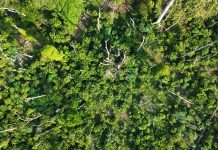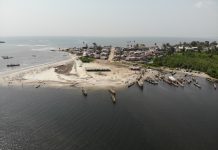Banner Image: Golden Veroleum Liberia’s palm nursery in Butaw, Sinoe County. The DayLight/Harry Browne
By Gabriel Dixon
MONROVIA – Dutch banks ING Group, ABN AMRO and Rabobank have provided 3.1 billion Euros (nearly US$3.5 billion) in the last five years to agriculture projects that have led to deforestation and human rights violation around the world, including Liberia, a new report has found.
The report, Dutch financial sector European frontrunner in financing deforestation, released by Friend of the Earth -Netherlands and Profundo recently, found that Golden Veroleum Liberia (GVL), Maryland Oil Palm Plantation (MOPP), the Cavalla Rubber Corporation (CRC), Salala Rubber Corporation (SRC) and the Liberia Agriculture Company (LAC) all received Dutch investments through their parent companies to knock down the forest and take away land belonging to rural communities.
These multinational companies use a chain of financial structures to fund their subsidiaries with money they receive from Dutch banks while hiding their connections and avoiding direct liabilities. Over the last five years, Golden Agri-Resources (GAR), Wilmar and Société Financière des caoutchoucs (SOCFIN) received different loan portfolios from the Dutch banks.
An earlier report by Friend of the Earth (FOE) found that GAR, in 2012 received US$90.8M from Rabobank and $152.21M the next year. The latter was given mainly for the operations of GAR. In 2017 and 2018, ABN AMRO provided a total of US$300.8M to GAR and its subsidiaries.
GVL is a subsidiary of GAR, a Singaporean multinational oil palm company that now has operations across 12 countries, including Liberia. GAR provides funding it receives from Dutch banks through the Verdant Funds to subsidiaries like Golden Veroleum Liberia.
MOPP and CRC are owned by Wilmar through SIFCA, a subsidiary of the company. Wilmar is also a Singaporean company that operates in the oil palm and rubber industries. SRC and LAC, on the other hand, are owned by SOCFIN, a Luxembourg multinational company whose primary activity involves managing palm oil and rubber plantations in parts of Africa and Southeast Asia. The French Bolloré Group holds at least 38.8% of the shares of the company. The Bolloré Group received a loan from ABN AMRO to fund its operations and those of its auxiliary companies such as SOCFIN.
“Despite voluntary commitments of banks and declarations by the (Dutch) government, Dutch financing of companies linked to deforestation and human rights abuses continues, said Danielle van Oijen of Friend of the Earth-Netherlands. “Hence, we call for legal obligations for the financial sector and a shift of finance towards agro-ecology and community-based forest management.”
Evidence of Deforestation, Land-grab and Human Right Violations
Subsidiaries of multinational companies operating in Liberia are all been investigated and found liable for deforestation, land grab and human rights abuses.
In February this year, GVL was declared non-compliance with the High Carbon Stock Approach (HCSA) by a panel set up by the High Carbon Stock Organization in a grievance filed by Friends of the Earth-Netherlands, Sustainable Development Institute, and Friend of the Earth-USA. HSCA Grievance Panel Report concluded that GVL was indeed guilty of deforestation and the destruction of biodiversity areas in Liberia.
In March 2018 the Roundtable on Sustainable Palm Oil (RSPO), an international body that develops and implement global standards for sustainable palm oil, found GVL guilty of complaints filed by the people of Butaw, Tarjowon, Du, Wolee and Nyennee, and Numopoh through the Civil Society Organizations Oil Palm Working Group (CSO – OPWG) for taking away their land without free, prior, and informed consent (FPIC), destruction of sacred sites, and deforestation. GVL also unlawfully dismissed workers for their involvement with communities aggrieved by the actions of the company in violation of both domestic and international labor laws.
GVL said it was now acting in compliance with international standards. “GVL is working with RSPO and HCSA under their respective complaints systems …,” said Alphonso Kofi, the company’s spokesman in an emailed response to The DayLight.
MOPP and CRC have been engaged in deforestation. Their operations have also led to mass forced removals and displacement of local communities in Pleebo-Sodoken District, Maryland County. In 2012, SIFCA security killed a man on its plantation. The company is also known for violating labor laws, including the illegal dismissal of pregnant employees.
SRC and LAC were accused of wrongfully taking away land belonging to local farming communities in Bong and Grand Bassa Counties. The two companies are also alleged to have been involved in bad labor practices and human rights abuses.
The companies did not respond to our queries for comments on the new report.
‘Disappointed’
Reacting to the report, Terry Panyonnoh, a local community rights advocate from Butaw, one of the communities affected in Sinoe County, felt “let down” by the Dutch Government and financial institutions. Panyonnoh was among several community rights advocates and who rallied the Dutch parliamentarians and financial institutions in October 2019 to halt their investment in projects linked to deforestation in their homelands.
“I am strongly disappointed in the government of the Netherlands after our visit and rally in 2019,” said Panyonnoh via Facebook. “I think we will mobilize and present a petition to the government of Liberia demanding the closure of companies engaged in deforestation and the abuse of human rights,” he concluded.
The report comes after global efforts by world leaders and international bodies, including financial institutions and agribusinesses to combat the impact and effect of climate change in the world. At the 26th United Nations Climate Conference (COP26), held in Glasgow, Scotland, world leaders sought to agree on how to step up global action to solve the climate crisis. A key issue among the objectives was to discuss measures to adapt to the inevitable impacts of climate change. Liberia made a commitment to cut down on deforestation in the forestry and agriculture sectors.
Up to press time, The DayLight did not get replies from ING, ABN AMRO, or Rabobank. This story will be updated as soon as we receive responses from the banks and the companies.





Facebook Comments